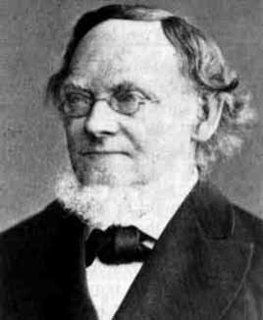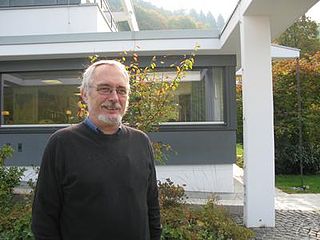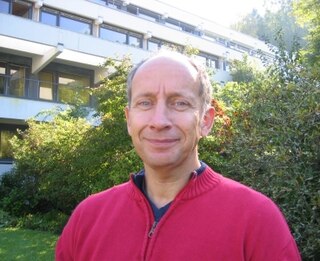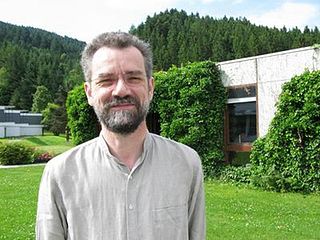External links
- Homepage of Thomas Zink
- List of all Leibniz price laureates (DFG) (in German) (PDF; 7,52 MB)
Thomas Zink | |
|---|---|
| Born | 14 April 1949 |
| Nationality | German |
| Known for | Works on Shimura varieties and p-divisible formal groups |
| Awards | Leibniz Prize (1992) |
| Scientific career | |
| Fields | Mathematics |
| Institutions | University of Bielefeld |
Thomas Zink (born 14 April 1949 in Berlin) is a German mathematician. He currently holds a chair for arithmetic algebraic geometry at the University of Bielefeld. He has been doing research at the Institute for Advanced Study in Princeton, at the University of Toronto and at the University of Bonn among others.
In 1992, he was awarded the Gottfried Wilhelm Leibniz Prize of the Deutsche Forschungsgemeinschaft joint with Christopher Deninger (Westfälische Wilhelms-Universität of Münster), Michael Rapoport (University of Wuppertal) and Peter Schneider (University of Cologne). The four researchers succeeded to apply modern methods of algebraic geometry to the solution of diophantine equations. Furthermore, he is a member of the German Academy of Sciences Leopoldina (Halle an der Saale).

Gottfried Wilhelm (von) Leibniz was a German polymath active as a mathematician, philosopher, scientist and diplomat. He is one of the most prominent figures in both the history of philosophy and the history of mathematics. He wrote works on philosophy, theology, ethics, politics, law, history and philology. Leibniz also made major contributions to physics and technology, and anticipated notions that surfaced much later in probability theory, biology, medicine, geology, psychology, linguistics and computer science. In addition, he contributed to the field of library science: while serving as overseer of the Wolfenbüttel library in Germany, he devised a cataloging system that would have served as a guide for many of Europe's largest libraries. Leibniz's contributions to this vast array of subjects were scattered in various learned journals, in tens of thousands of letters and in unpublished manuscripts. He wrote in several languages, primarily in Latin, French and German, but also in English, Italian and Dutch.

Hermann Günther Grassmann was a German polymath, known in his day as a linguist and now also as a mathematician. He was also a physicist, general scholar, and publisher. His mathematical work was little noted until he was in his sixties.

Gottfried Wilhelm Leibniz University Hannover, also known as the University of Hannover, is a public research university located in Hanover, Germany. Founded on 2 May 1831 as Higher Vocational School, the university has undergone six periods of renaming, its most recent in 2006.

Gerd Faltings is a German mathematician known for his work in arithmetic geometry.
The Gottfried Wilhelm Leibniz Prize, in short Leibniz Prize, is awarded by the German Research Foundation to "exceptional scientists and academics for their outstanding achievements in the field of research". Since 1986, up to ten prizes are awarded annually to individuals or research groups working at a research institution in Germany or at a German research institution abroad. It is considered the most important research award in Germany.

Eckart Viehweg was a German mathematician. He was a professor of algebraic geometry at the University of Duisburg-Essen.

Hélène Esnault is a French and German mathematician, specializing in algebraic geometry.
The law of continuity is a heuristic principle introduced by Gottfried Leibniz based on earlier work by Nicholas of Cusa and Johannes Kepler. It is the principle that "whatever succeeds for the finite, also succeeds for the infinite". Kepler used the law of continuity to calculate the area of the circle by representing it as an infinite-sided polygon with infinitesimal sides, and adding the areas of infinitely many triangles with infinitesimal bases. Leibniz used the principle to extend concepts such as arithmetic operations from ordinary numbers to infinitesimals, laying the groundwork for infinitesimal calculus. The transfer principle provides a mathematical implementation of the law of continuity in the context of the hyperreal numbers.

Kurt Mehlhorn is a German theoretical computer scientist. He has been a vice president of the Max Planck Society and is director of the Max Planck Institute for Computer Science.

Wolfgang Lück is a German mathematician who is an internationally recognized expert in algebraic topology.

Michael Rapoport is an Austrian mathematician.
Emmerich (Emo) Welzl is a computer scientist known for his research in computational geometry. He is a professor in the Institute for Theoretical Computer Science at ETH Zurich in Switzerland.

Eberhard Knobloch is a German historian of science and mathematics.

Joachim Cuntz is a German mathematician, currently a professor at the University of Münster.

Peter Scholze is a German mathematician known for his work in arithmetic geometry. He has been a professor at the University of Bonn since 2012 and director at the Max Planck Institute for Mathematics since 2018. He has been called one of the leading mathematicians in the world. He won the Fields Medal in 2018, which is regarded as the highest professional honor in mathematics.

Klaus Hulek is a German mathematician, known for his work in algebraic geometry and in particular, his work on moduli spaces.
Ernst Wilhelm Mayr is a German computer scientist and mathematician. He received the Gottfried Wilhelm Leibniz Prize in 1997 awarded for his contributions to theoretical computer science.

Yuri Tschinkel is a Russian-German-American mathematician, specializing in algebraic geometry, automorphic forms and number theory.

Peter Bernd Schneider is a German mathematician, specializing in the p-adic aspects of algebraic number theory, arithmetic algebraic geometry, and representation theory.